WASHINGTON, D.C. -- U.S. economic confidence fell slightly to -16 in March, from -13 in February, and is at its lowest level since December. Monthly economic confidence was at a five-year high in February, tied with the January 2013 and November 2012 scores.
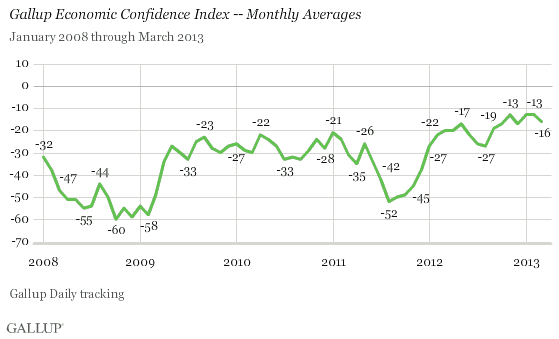
These results are based on Gallup Daily tracking interviews, conducted by landline and cellphone, with more than 15,000 Americans from March 1-31. Gallup's Economic Confidence Index is based on Americans' ratings of current economic conditions in the United States as well as their assessments of whether the economy is getting better or worse.
Most of the decline in Americans' monthly economic confidence came from a drop in Americans' economic outlook, which fell to -13 from -9 in February -- possibly a reaction to the budget sequestration cuts that went into effect March 1. The March score is based on 41% of Americans saying the economy is getting better and 54% saying it is getting worse.
At the same time, Americans' assessments of current economic conditions declined slightly. The net current conditions score of -18 in March is down slightly from -16 for the prior month. The March score reflects 19% of Americans rating current U.S. economic conditions as excellent or good, and 37% saying they are poor.
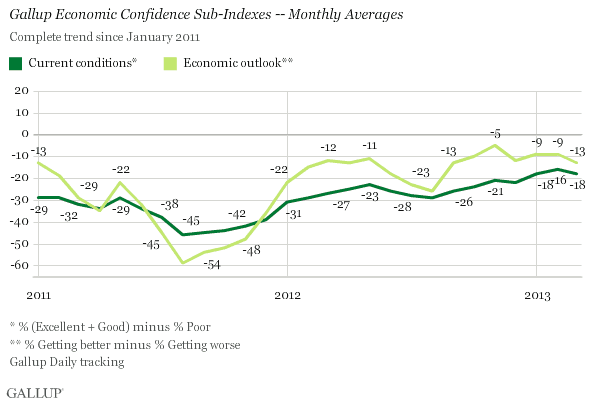
The decline in economic confidence in March is due to lower confidence levels recorded in early March, immediately after the budget cuts went into effect. Americans' economic confidence bounced back in mid-March, likely as a reaction to record-high stock prices. Americans' weekly confidence was -12 in the last week of March -- four points off of the five-year weekly high set in early February.
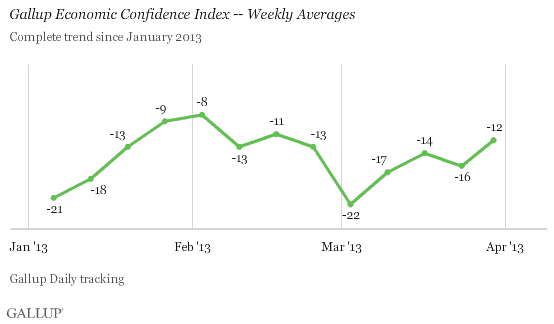
Democrats' Economic Confidence Slips in March
Democrats' monthly economic confidence dropped nine points, to +15, in March, the lowest monthly level of confidence for this group since August 2012. Republicans saw a gain of four points last month, to -47, the highest confidence level for them since May 2012. Independents' economic confidence was -22 in March, about on par with their confidence since September.
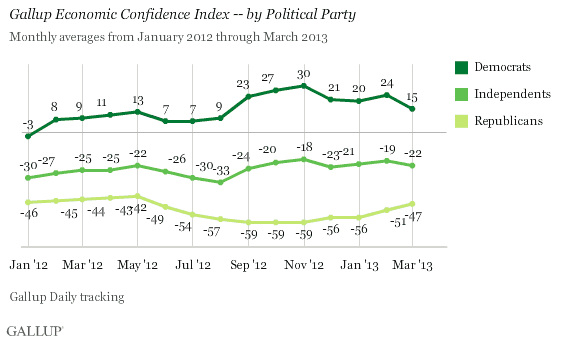
Upper-Income Americans' Confidence Close to Five-Year Monthly High
Upper-income Americans' economic confidence was -5 in March, similar to this group's five-year monthly high of -3, reached in February. Middle- and lower-income Americans' economic confidence fell to -18 in March from -14 in February and January.
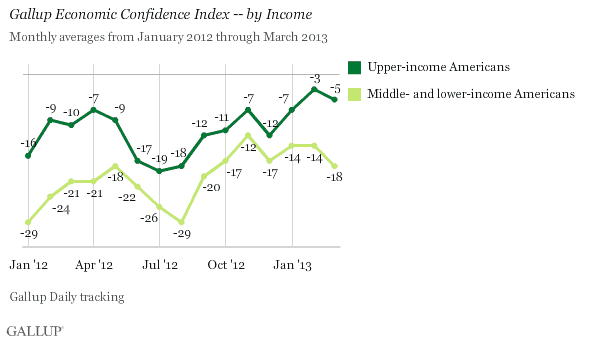
Implications
The Gallup Economic Confidence Index fell three points in March from its five-year monthly high of -13 in February. The weekly averages show that most of the decline occurred at the beginning of the month, immediately after the automatic spending cuts took effect. Americans' confidence in the economy was higher during the rest of the month than it was at the beginning, which may be due, in part, to record-high stock prices, a boost in housing prices, and lower gas prices.
Like the Gallup Economic Confidence Index, the preliminary Thomson Reuters/University of Michigan Consumer Sentiment Index showed a sharp decline at the beginning of last month. Also like the Gallup Index, the Conference Board's Consumer Confidence Index showed a decline for all of March.
The improvement in economic confidence during the last week of March signals that economic confidence may rebound in April.
Gallup.com reports results from these indexes in daily, weekly, and monthly averages and in Gallup.com stories. Complete trend data are always available to view and export in the following charts:
Daily: Employment, Economic Confidence, Job Creation, Consumer Spending
Weekly: Employment, Economic Confidence, Job Creation, Consumer Spending
Read more about Gallup's economic measures.
View our economic release schedule.
Survey Methods
Results for this Gallup poll are based on telephone interviews conducted March 1-31, 2013, on the Gallup Daily tracking survey, with a random sample of 15,304 adults, aged 18 and older, living in all 50 U.S. states and the District of Columbia.
For results based on the total sample of national adults, one can say with 95% confidence that the margin of sampling error is ±1 percentage point.
Interviews are conducted with respondents on landline telephones and cellular phones, with interviews conducted in Spanish for respondents who are primarily Spanish-speaking. Each sample of national adults includes a minimum quota of 50% cellphone respondents and 50% landline respondents, with additional minimum quotas by region. Landline telephone numbers are chosen at random among listed telephone numbers. Cellphones numbers are selected using random digit dial methods. Landline respondents are chosen at random within each household on the basis of which member had the most recent birthday.
Samples are weighted to correct for unequal selection probability, nonresponse, and double coverage of landline and cell users in the two sampling frames. They are also weighted to match the national demographics of gender, age, race, Hispanic ethnicity, education, region, population density, and phone status (cellphone only/landline only/both, cellphone mostly, and having an unlisted landline number). Demographic weighting targets are based on the March 2012 Current Population Survey figures for the aged 18 and older U.S. population. Phone status targets are based on the July-December 2011 National Health Interview Survey. Population density targets are based on the 2010 census. All reported margins of sampling error include the computed design effects for weighting.
In addition to sampling error, question wording and practical difficulties in conducting surveys can introduce error or bias into the findings of public opinion polls.
For more details on Gallup's polling methodology, visit www.gallup.com.
